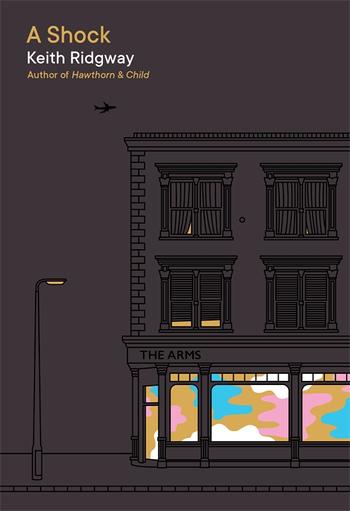I picked up a copy of “Hawthorn and Child” a while back, when I hadn’t heard of Keith Ridgway. Blurbs on the back mentioned Eggers, Nicholson, Murakami, Eugenides, and it’s published by Granta, so seemed well worth a go. Now I can barely recall a time when the name Ridgway was unknown to me. There’ve been a lot of online mentions of this novel-in-stories. John Self championed it, people I think are super smart have raved about it (@seventydys I’m looking at you), and there are a fair few reviews around (I try not to read reviews when I’m planning to write one of my own). I’ve looked Ridgway up online and come across some scorchingly good blogs of his, including this:
‘Writing is running full tilt at a closed door with your shoulder down. And each time you write it’s another hit. And you hope each time that this time you will break though, into that part of yourself where all the skill is, where everything will be within reach, where it will all be easy. And you just keep on rushing the door. And you just end up with the skin gone purple and a shard of bone slicing a muscle, and you’re fucked. You are fucked by a collar bone trauma and the door is so solid that you are looking at the wall and you are starting to think that you might have been better a little to the right or the left, or that the thing that you think is a door is not a door at all and you are not supposed to go through it, it is a cliff and you are supposed to climb it. And you think, at your age, why don’t I try the handle? But it’s locked. Of course it’s locked. You’re sure you must have checked. At the start. At the beginning. Of all this. And you think, over your grey tea and your cold toast, maybe I should ask for a key.
Writing is running full tilt at a closed door with your shoulder down. And each time you write it’s another hit. And you hope each time that this time you will break though, into that part of yourself where all the skill is, where everything will be within reach, where it will all be easy. And you just keep on rushing the door. And you just end up with the skin gone purple and a shard of bone slicing a muscle, and you’re fucked. You are fucked by a collar bone trauma and the door is so solid that you are looking at the wall and you are starting to think that you might have been better a little to the right or the left, or that the thing that you think is a door is not a door at all and you are not supposed to go through it, it is a cliff and you are supposed to climb it. And you think, at your age, why don’t I try the handle? But it’s locked. Of course it’s locked. You’re sure you must have checked. At the start. At the beginning. Of all this. And you think, over your grey tea and your cold toast, maybe I should ask for a key.”
It’s not taken long for me to become a fan. His words resonate and sing with truth.
“Hawthorn and Child” are “mid-ranking detectives” introduced to us in the first story while they investigate the shooting of a young man who recalls only, “A car. Shot me.”
The ensuing investigation sets the tone for the rest of the book. The detectives question witnesses, talk together, wait in the hospital. A witness says the victim told him the car was “ochre” although Hawthorn and Child think he may have said, “old car.” As is often the case in life, there is no neat wrapping up of the mystery, no resolution.
It’s a slippery read. The prose is so clear and natural, it flows beautifully, and yet there are gaps, missing information. Each story is linked, sometimes just by a glimpse of one of the recurrent characters. (As well as Hawthorn and Child, the criminal, Mishazzo recurs. He weaves in and out of the narrative; a shadowy danger.)
It’s a contradictory text, at once engaging and puzzling. There’s confusion and precision as what is unsaid, the silences, the gaps, the missing pieces of information, add together to form a whole. And that whole becomes a curiously realistic portrayal of London, crime, and daily realities. There’s a mash up of sex and policing, there’s violence, and death. Yet it’s the quiet moments, the spaces between, that count most.
Something mentioned in one story reappears as the centre of another, Hawthorn and Child are not the focus. It’s a tough book to review – I find the idea of it being a detective novel quite misleading, and yet, it is ostensibly about police work. It’s an easy read because the quality of the story telling is so good, and yet it is not simple.
For me the stand out story is “Rothko Eggs”. It’s a pitch-perfect tale of a young girl and her relationships. From the misfire of the title (you’ll have to read to find out) to the gaps between her and her boyfriend, it’s skilfully done and I was left wondering how the fuck Ridgway was able to convey so much.
“He said nothing. She looked at him.
He was quiet. He had drifted off somewhere.”
It’s an excellent book.






